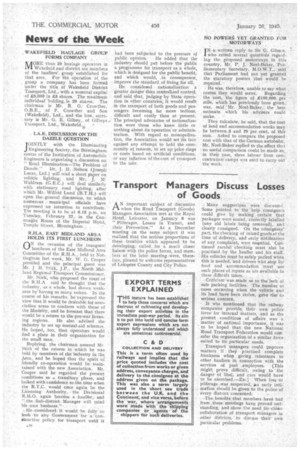News of the Week
Page 18

If you've noticed an error in this article please click here to report it so we can fix it.
WAKEFIELD HAULAGE GROUP FORMS COMPANY _
lk/IORE than 20 haulage operators in AVI Wakefield and district are members of the hauliers' group established for that area. For the operation of the group a company has been formed nnder the title of Wakefield District Transport, Ltd., with a nominal capital of £5,000 in £5 shares. The maximum individual holding is 20 shares. The chairman is Mr. R. G. Crowther, 0.B.E., of F. Crowther and Son (Wakefield), Ltd., and the hon. secretary is Mr. G. E. Gilbey, of Gilbeys.... Transport, Ltd., Wakefield.,,
. I.A.E. DISCUSSION ON THE DAZZLE QUESTION OINTLY with the Illuminating Engineering Society, the Birmingham centre of the Institution of Automobile Engineers is organizing a discussion on "Road Illumination—The Problem of Dazzle." Dr. J. H. Nelson (Joseph Lucas, Ltd.) will read a short paper on vehicle lighting, and Mr. J. M. Waldram (G.E.C.) will deal similarly with stationary road lighting, after which Mr. Wilfrid Lund (B.T.H.) will open the general discussiou, to which numerous municipal officials have expressed an intention to contribute. The meeting is to he at 6.15 p.m. on Tuesday. February 27, in the Connaukht Room of the Imperial Hotel, Temple Sheet, Birmingham..
R.H.A. EAST MIDLAND AREA HOLDS ITS FIRST LUNCHEON
ON the occasion of the ,inauguraI luncheon of the East Midland Area Committee of the R.H.A.,held at Nottinghain fast week, Mr. W. G. Cooper presided and the principal guest was Mr. J H. Stirk, J.P., the North Midland Regional Transport Commissioner.
Mr. Stirk, who proposed the toast' of the R.H.A said he thought that the industry, as a whole, had shown weakness by having so many voices. In the course of his remarks, he-expressed the view that it would be desirable for association areas to conform with those of the Ministry, and he forecast that there would be a return to the pre-war licens
ing regions. He also advised the industry to set up mutual-aid schemes. He hoped, .too, that operators would find a place in their organization for the small man.
Replying, the chairman assured Mr Stirk of the esteem in which he was held by members Of the industry in the. Area, and he hoped that the spirit of friendly co-operation would be maintained with the new Association. Mr. Cooper said he regarded the present conditions as s transitory phase, and looked with confidence to the time when the R.T.C. would once again be the Licensing Authority, • the Divisional R.H.O. again become a haulier,: and " the -Sub-district Manager will mind his ownbusiness!'
He considered. it would he folly -try look to any Goverment for a:toffstructive policy fortransport until it
had been subjected to the pressure of public opinion. He added that the industry should put before the public a programme for transport as a whole, which is designed for the public benefit, and which would, _in consequence, improve the standard of living for all.
He consideied nationalization a greater danger than centralized control, and said that, judging by State operation in other countries, it would result in the transport of both goods and passengers becoming far more tedious, difficult and costly than at present. The principal advocates of nationaliza, tion were those who knew little or nothing about its Operation or administration. With regard to monopolization, the Association would set its face against any attempt to hold the community at ransom, to set up price rings or costs based on artificial conditions, or any inflation of the cost of transport to the user.
NO POWERS YET GRANTED FOR MOTORWAYS
IN a written reply to Sir G. Gibscn. I who raised several questions regarding the proposed motorways in this country, Mr, P. J. Noel-Baker, Parliamentary Secretary, M.O.W.T., said that Parliament had not yet granted the statutory powers that would be required.
He was, therefore, unable to say what routes they would serve. Regarding the cost, the figure of £100,000 per mile, which ,has previously been given, was, said :Mr. Noel-Baker, the best estimate which his advisers could make.
They eakulate, he said, that the cost of land and accommodation works may be between 5 and ro per cent, of thrs sum. Asked to compare the proposed cost with that of the German autobahn, Mi. Noel-Baker replied to the effect that no useful comparison could be made as, in their case, slave labour from concentration camps' was used to carry out the work.




















































